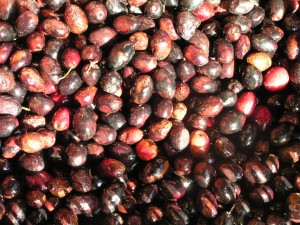 Bonjour for one last final post as my France adventure draws to a close. Since my main objective of the internship was to fully understand the concept of terroir and how the farm incorporates value added agriculture in the form of tourism, I am going to elaborate once again on these concepts now that I have actually had field experience (and can understand a lot more that is said to me in French!) My internship has been absolutely amazing, and I strongly encourage anyone looking for an internship next summer to abandon their paid, somewhat normal internship offers for an unknown adventure (thank you Cornell Tradition for making this opportunity financially feasible.) I had the chance to do so much ranging from planting olives trees, sorting olives, bottling olive oil, packaging, guiding tastings and giving farm tours in French. I also had the opportunity to meet with research professors, local producers, and government officials to learn about agriculture policy and consumer trends.
Bonjour for one last final post as my France adventure draws to a close. Since my main objective of the internship was to fully understand the concept of terroir and how the farm incorporates value added agriculture in the form of tourism, I am going to elaborate once again on these concepts now that I have actually had field experience (and can understand a lot more that is said to me in French!) My internship has been absolutely amazing, and I strongly encourage anyone looking for an internship next summer to abandon their paid, somewhat normal internship offers for an unknown adventure (thank you Cornell Tradition for making this opportunity financially feasible.) I had the chance to do so much ranging from planting olives trees, sorting olives, bottling olive oil, packaging, guiding tastings and giving farm tours in French. I also had the opportunity to meet with research professors, local producers, and government officials to learn about agriculture policy and consumer trends.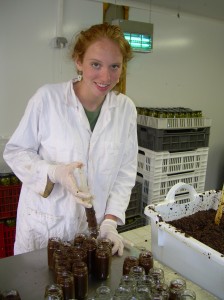
In my own opinion, the French seem to have their priorities right when it comes to food much more so then we do here in the States. They value quality and taste over time and convenience, and this is reflected in the fact that a business such as the Domain de l’Oulivie exists in France in the first place. I can clearly understand why one of the major challenges of the farm is the fact that Spain can export olive oil to grocery stores in France for a fraction of the price that it takes for the Domain to hand-produce their olive oil since it is so manually, labor intensive. I feel that if the Domain operated in the United States, this would be even more of a problem, but in France consumers are driven by the desire to connect to their food. This connection is important for the Domain because it allows them to convey to customers that the extra price means that the olive oil is more flavorful, healthier for the tree, rooted in tradition, and generally of a better quality. French consumers are very receptive to this, as Eric Cellier, chef of Maison De La Lozere, stated in our interview,“ I chose the oil of the Domaine de l’Oulivie because it is a product of quality, and is a product very representative of the region. It is a product made with passion, soul, and feeling. I use the oil of the Domaine de l’Oulivie and no others.”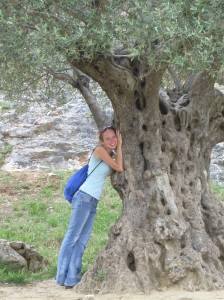
It is clear that the olive farm gives added value to their product from the standpoint that their quality is so high. In addition to this, value addition is given based on the fact that their product line is so unique due to their cosmetics, flavored olive oils, olive spreads, and their extensive use of heirloom varieties of olives.
The agro-tourism aspect of the farm equally gives value to their product. In the last few weeks I was at the farm, the Domain started a picnic program where customers could come and eat lunch purchased from the store, partially prepared by yours truly, in the olive grove. In addition to this, the festivals, history and tradition of the farm, educational video about olive harvest, translated from French to English for tourists, again by yours truly, and on-site store continue to add value for the farm. The farm is able to market to a wide range of consumers, from residents, tourists, exporters, other local boutiques, restaurants, retired couples, and children. I feel that by working on the farm, taking part in all of the activities, and interacting with the wide variety of customers, I more fully understand the concept of agro-tourism. As far as terroir goes, I started off this blog by searching the academic journals for articles to answer and clearly define terroir, and wound up accidently stumbling upon the perfect definition while interviewing one of my bosses, Pierre Vialla. When asked what does terroir mean, Pierre responded, “Terroir brings together history; the history of the land on which we live, the men who cultivate the soil for generations and the products that result. The history of men and the products, this is what terroir is for me.”
Needless to say, I truly enjoyed my French experience. It is nearly impossible to achieve a complete understanding of French agriculture, but I tried to learn as much as possible, and I can definitely say that I successfully pursued French desserts. Thanks for reading-merci and au revoir!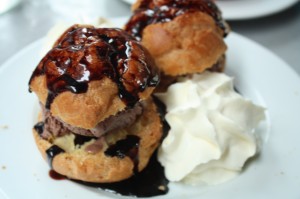

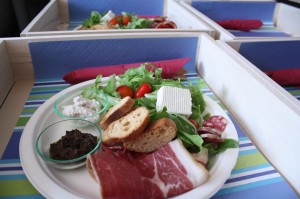
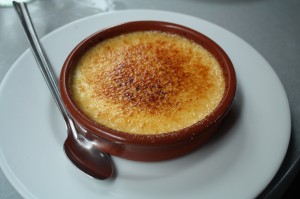
Speak Your Mind